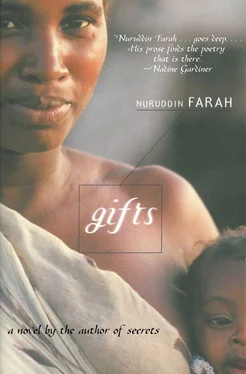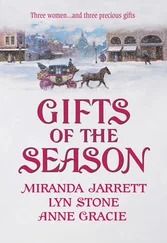Nuruddin Farah - Gifts
Здесь есть возможность читать онлайн «Nuruddin Farah - Gifts» весь текст электронной книги совершенно бесплатно (целиком полную версию без сокращений). В некоторых случаях можно слушать аудио, скачать через торрент в формате fb2 и присутствует краткое содержание. Год выпуска: 2011, Издательство: Arcade Publishing, Жанр: Современная проза, на английском языке. Описание произведения, (предисловие) а так же отзывы посетителей доступны на портале библиотеки ЛибКат.
- Название:Gifts
- Автор:
- Издательство:Arcade Publishing
- Жанр:
- Год:2011
- ISBN:нет данных
- Рейтинг книги:3 / 5. Голосов: 1
-
Избранное:Добавить в избранное
- Отзывы:
-
Ваша оценка:
- 60
- 1
- 2
- 3
- 4
- 5
Gifts: краткое содержание, описание и аннотация
Предлагаем к чтению аннотацию, описание, краткое содержание или предисловие (зависит от того, что написал сам автор книги «Gifts»). Если вы не нашли необходимую информацию о книге — напишите в комментариях, мы постараемся отыскать её.
Gifts — читать онлайн бесплатно полную книгу (весь текст) целиком
Ниже представлен текст книги, разбитый по страницам. Система сохранения места последней прочитанной страницы, позволяет с удобством читать онлайн бесплатно книгу «Gifts», без необходимости каждый раз заново искать на чём Вы остановились. Поставьте закладку, и сможете в любой момент перейти на страницу, на которой закончили чтение.
Интервал:
Закладка:
Nasiiba was of a mind to disregard her mother’s advice, and she repeated her question, “What was he talking about?”
“Mataan has borrowed a motor-scooter to give me a lift,” Duniya replied, regretting it the instant the words had left her lips.
Nasiiba was dismissive of the man who owned the Vespa, saying, “Do you know what people say?”
“No, what do they say?”
“The man is a homosexual, an old man in his fifties who prefers the company of younger boys. Did Mataan tell you that?”
There was the clichéd silence of a pin-dropping quality.
The quarrel was cut short by the arrival of the taxi taking Nasiiba and Yarey to their respective schools. Nasiiba opened the windows overlooking the road and shouted something to the man whom she called Axmad. Meanwhile she and Yarey stumbled into their school-uniforms, each reminding the other to be quick. “Remember we’re going house-hunting this afternoon,” Duniya said to Nasiiba.
“Right-oh.” Nasiiba mimicked an American film heroine dashing out of a room.
Mataan and Duniya had breakfast together, Mataan making the omelette and tea, and afterwards clearing the trays and doing the washing-up, including his sisters’. Duniya was undecided whether to wear her hair covered or uncovered. Given that she would be on a motor scooter and not in a car, would her hair be a scatter of plaits, waving in all directions, like the hands of a bad swimmer drowning? Thinking of their safety (she was actually thinking about seat-belts as well as Bosaaso), she wondered if it was possible to find helmets at such short notice. It was too late in the day to worry about it.
“Tell me, do you like Bosaaso?” she said to Mataan.
Mataan hesitated, then said, “I do — really.”
“What do you like about him?”
“I feel comfortable with him.”
“Comfortable in what sense?” He appeared to be having difficulty with his words; he stammered, every consonant proving a hurdle. The brown in his eyes darkened.
She had almost given up on getting any answer out of him as she asked, “Do you like him as much as you liked Taariq when you were a lot smaller?” And she felt foolish saying this.
“As it happens, I always prefer having friends older than me, and Bosaaso is the sort of man whose friendship I would tend to cultivate, someone whose learning I would emulate. I don’t regret my closeness to Taariq, and hold no resentful feelings towards him.”
“What would you do if you were me?” she said.
He sat forward, as though a gun had been pointed at his nape. “In what regard, Mother?”
“Would you marry him?”
Mataan’s tongue was active, not in the act of speech but scouring the inside of his mouth as if searching for a clue there. “Knowing you, Mother,” he said at last, “you’ll make up your mind one way or the other on the spur of the moment. So I don’t know what to say.”
Somewhere in the labyrinth of Duniya’s mind there was a cul de sac. She said, “People say that I’m after his money.”
“People say all sorts of wicked things,” he echoed.
“Doesn’t that worry you?”
His lips swelled out in handsome protrusion as he thought about this. He said, “I don’t mean to be disrespectful, but what has Bosaaso got that you could be after by way of money, a Green Card or property? I doubt very much if his income is higher than Uncle Abshir’s, who’s prepared to give you all you need, and foot all our educational bills anywhere in the world.”
“All the same, people’s tongues are busy, spreading evil gossip.”
“I wouldn’t worry about them if I were you,” he said. “They say terrible things about the man I borrowed the scooter from. It’s his affair if he is homosexual; what makes his sexual taste their business I don’t know. Some people say unkind things about Waris on account of the age difference between us.” His lips might have been those of an infant who had just been breast-fed, and not sufficiently.
“You love her, don’t you?”
An open mouth is like an open door: one is tempted to look in. Mataan’s had a beautiful set of teeth, with a gap in the centre of the top row. Women never failed to comment on his fanax, wishing it was Nasiiba who had it, for it is commonly believed that girls look prettier when they have gaps in their teeth. Such good-looking features are an asset assuring women of men’s attention and marriage. And Nasiiba would retort: Who wants to marry anyway?
“You don’t have to answer my question,” said Duniya.
This was meant to prod him, considering that he was susceptible to her probings. “I think I’m in love with her, yes,” he said, and he was immediately ill at ease.
“Shall we leave?” she asked.
He stood up, tall, slim and shy. “Are you ready?”
She too got to her feet. She felt uncomfortable in the slacks she had on, her navel bulge an irritation. But she wasn’t going to change into a dress or her uniform which she had stuffed into her bag; wearing either would be inconvenient on a scooter. Mataan was waiting for her by the Vespa, modest as the dull, brown and humble grey colours which he liked.
“Here we are,” he said, kick-starting the machine.
Duniya sat side-saddle. It was the first time she had ridden a motor scooter and it scared her. Mataan had to stop two or three times, to remind her that it was important to co-ordinate their bodily balance, otherwise they might tip over and hurt themselves. “It’s like a boat with an outboard engine,” he said, repeating what the owner had told him. But Duniya had no idea what he was talking about, never having been in such a contraption.
However, she enjoyed the ride once they got going, the wind blowing in her face, her ears filling with air, her head empty of all worrying thoughts, save the new pleasant sensation of being on a scooter and no longer scared. It was like a new-found freedom. She felt light. The roads were lined on both sides by people waiting endlessly for transport which never arrived. In her mind, these people had arrived to wave to the two of them riding past, like a presidential motorcade receiving a tumultuous welcome.
There was something scary about the experience. The sky was out of bounds and the earth appeared either too far below her or else too close to her feet, which hung down, almost touching it. There seemed many more potholes than she remembered encountering when in Bosaaso’s car. On the other hand, they could be spotted well in advance, and be avoided. Duniya’s eyes were active and registered the details of people’s clothes. “I feel wonderful,” Duniya shouted. “It feels wonderful.”
“What?” shouted Mataan.
She repeated what she had said, adding, “We must buy a scooter.” He didn’t show any reaction; maybe he hadn’t heard her suggestion.
Her sides began to ache and her muscles stretched with acute pain from having sat awkwardly, like someone holding back her weight away from another person sharing a limited space. None the less this was decidedly more fun than the humiliation of being in the company of somebody one didn’t know. In another sense she was happy to make the point to Bosaaso that she had alternative ways of getting to work, wasn’t totally reliant on his good-will and kind gestures, thank you.
“Look at them,” Duniya said.
He slowed down and asked, “Look at whom?”
“Look at them dressed in these exquisitely tailored clothes!” and she pointed at the women and men on either side of road, potential passengers of buses that never arrived, thumb-raisers for lifts that were never offered. “I wonder if they’re on their way to a wedding or to a seasonal festivity in their office. How can they care so much about their appearances when they’re penniless?” Her ribs pained from her long shout, her lungs ran out of the breath she could generate. She paused, then after a while continued, “Both as individuals and as governments, we Somalis, better still, we Africans, tend to live beyond our means.”
Читать дальшеИнтервал:
Закладка:
Похожие книги на «Gifts»
Представляем Вашему вниманию похожие книги на «Gifts» списком для выбора. Мы отобрали схожую по названию и смыслу литературу в надежде предоставить читателям больше вариантов отыскать новые, интересные, ещё непрочитанные произведения.
Обсуждение, отзывы о книге «Gifts» и просто собственные мнения читателей. Оставьте ваши комментарии, напишите, что Вы думаете о произведении, его смысле или главных героях. Укажите что конкретно понравилось, а что нет, и почему Вы так считаете.











